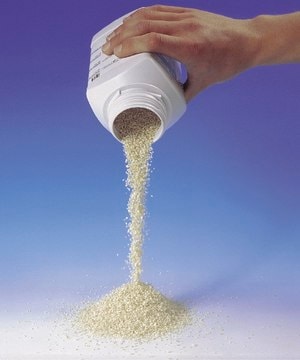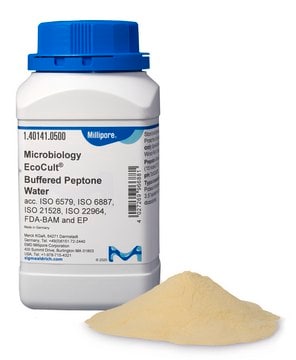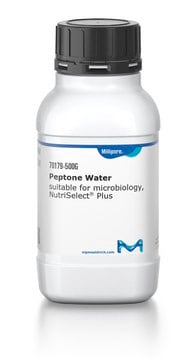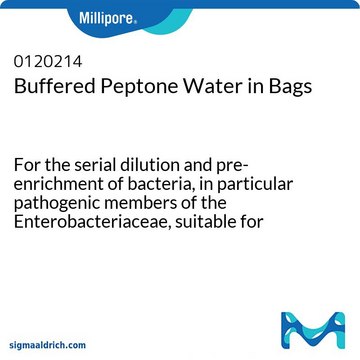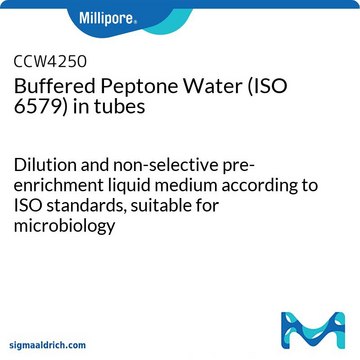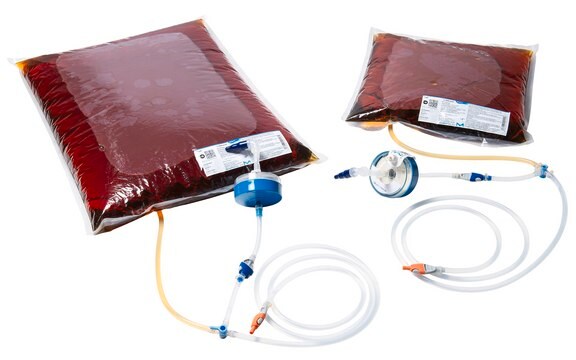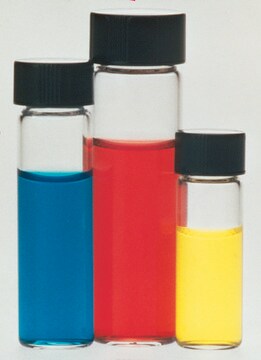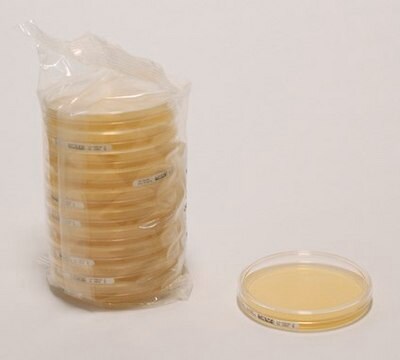77187
Buffered Peptone Water
NutriSelect® Plus, powder, pack of 500g or 25kg, pack of 500 g or 25 kg, non-sterile
Synonym(s):
BPW, Buffered Peptone Water, Tryptone Phosphate Water
About This Item
Recommended Products
Agency
according to GB 4789.30-2016
according to GB 4789.40-2016
according to ISO 21528-1:2017
according to ISO 22964:2017
Quality Level
sterility
non-sterile
product line
BioChemika
form
powder
shelf life
limited shelf life, expiry date on the label
composition
disodium hydrogen phosphate, 3.5 g/L
peptone, 10 g/L
potassium dihydrogen phosphate, 1.5 g/L
sodium chloride, 5 g/L
manufacturer/tradename
NutriSelect® Plus
packaging
pack of 500 g or 25 kg
pack of 500g or 25kg
technique(s)
microbe id | specific enzyme detection: suitable
microbiological culture: suitable
color
faintly beige Powder, Homogeneous, free-flowing powder
clear faintly brownish-yellow Prepared media, without any precipitate
final pH
7.2±0.2 (25 °C)
application(s)
environmental
food and beverages
microbiology
pathogen testing
sample preparation
suitability
Providencia spp.
nonselective for Citrobacter spp.
nonselective for Cronobacter spp.
nonselective for Escherichia coli
nonselective for Klebsiella spp.
nonselective for Proteus spp.
nonselective for Pseudomonas spp.
nonselective for Salmonella spp.
nonselective for Shigella spp.
nonselective for Staphylococcus spp.
nonselective for Streptococcus spp.
nonselective for Yersinia spp.
nonselective for bacteria (General Media)
nonselective for coliforms
nonselective for enterobacteriaceae
Looking for similar products? Visit Product Comparison Guide
General description
Application
Preparation Note
Storage and Stability
- Store prepared media below 8°C, protected from direct light.
- Store dehydrated powder, in a dry place, in tightly sealed containers at 2-25°C.
Other Notes
Footnote
The designations basic, plus, or prime are added to indicate the quality control level, from basic quality control to standard QC plus to prime for full regulatory compliance.
Legal Information
Storage Class Code
13 - Non Combustible Solids
WGK
WGK 3
Flash Point(F)
Not applicable
Flash Point(C)
Not applicable
Personal Protective Equipment
Choose from one of the most recent versions:
Already Own This Product?
Find documentation for the products that you have recently purchased in the Document Library.
Articles
An article concerning the detection, identification, differentiation, and cultivation of Pseudomonas species.
Streptococci- Overview of Detection, Identification, Differentiation and Cultivation Techniques
Protocols
General guidance for the detection and enumeration of Enterobacteriaceae in food according to EN-ISO 8523:1991 and EN-ISO 4832:1991, respectively.
Our team of scientists has experience in all areas of research including Life Science, Material Science, Chemical Synthesis, Chromatography, Analytical and many others.
Contact Technical Service